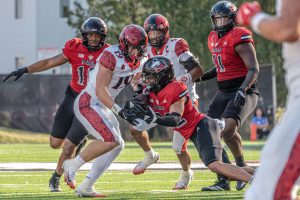A safer intimate encounter
February 11, 2004
Students looking for a safer route to an intimate encounter can look to the University Health Service for help.
After years of advancements in the Health Enhancement Services’ contraceptive budget, free condoms and lubricants are now plentiful at NIU.
Health Enhancement Services has an annual budget of $13,000 to provide protection for sexually active students.
The UHS has been developing the “safer sex” program since the mid-’80s, after voicing a strong need for budget increases, said Steve Lux, Health Enhancement Services health educator. “We call it ‘safer sex’ rather than ‘safe sex’ because we feel there is no such thing as safe sex,” Lux said.
“Getting condoms to students had barriers,” Lux said.
Previously, condoms only were available through the UHS pharmacy and costed 50 cents, Lux said.
“Money was an issue,” Lux said. “The budget for our contraceptives was maybe $3,000 to $4,000.”
After the AIDS virus broke out in the mid-’80s, Lux and other staff members recognized an immediate need for available contraceptives.
Lux and others decided to ask John Dalton, then vice-president of Student Affairs, for funds. They planned to explain to Dalton that at the forefront of AIDS, new knowledge was coming about and causing fear, and something had to be done, Lux said.
Once funds were increased for a new program, the staff researched consumer reports to find the safest and most economically efficient condom.
The first condom the Health Enhancement Services provided was the Schmid condom in the late ’80s.
“They rated fairly high in consumer reports,” Lux said.
NIU began purchasing condoms in bulk from the company with the new funds to make them widely available to students.
Some people were offended by the idea of condom distribution.
“But it’s not about distribution; it’s about availability,” Lux said. “We’re trying to reduce disease and unwanted pregnancy. We’re not trying to say everybody should be having sex.”
Some students said they think the Health Enhancement Services should make the program more known.
“If I knew about it, I would have taken advantage of it already,” said freshman chemistry major Matt Bluemlein. “More people would know about it if they made students more aware.”
It facilitated vending machines in residence hall bathrooms and other areas, so students could purchase condoms for a low price after the UHS was closed.
Since 1988, condoms in the vending machines have been available for 50 cents.
“On my floor, about half of the people know they’re there,” said Andrew Schumake, a freshman business administration major. “I use them, but I think NIU could do a better job getting them out in the open.”
UHS makes 15 cents commission from condom sales through the vending machines.
The commission isn’t much; it helps with funds to continue the program, Lux added.
The budget includes the cost of condoms, lubricants, the female condom, male polyurethane and sheer glide dams.
Lux added that the budget includes anything that helps makes sex safer.
“We are becoming more diverse,” Lux said. “We try to respond to student requests.”
Currently, the Durex condom is the most widely used contraceptive by the UHS. Durex allows institutional, bulk sale for the supply, Lux said.
It has attempted to purchase other condoms in bulk, such as Trojan, but some brands students request are not carried because of cost.”
By the early-to-mid ’90s, Lux said, many companies
For more information, call 753-9755.






